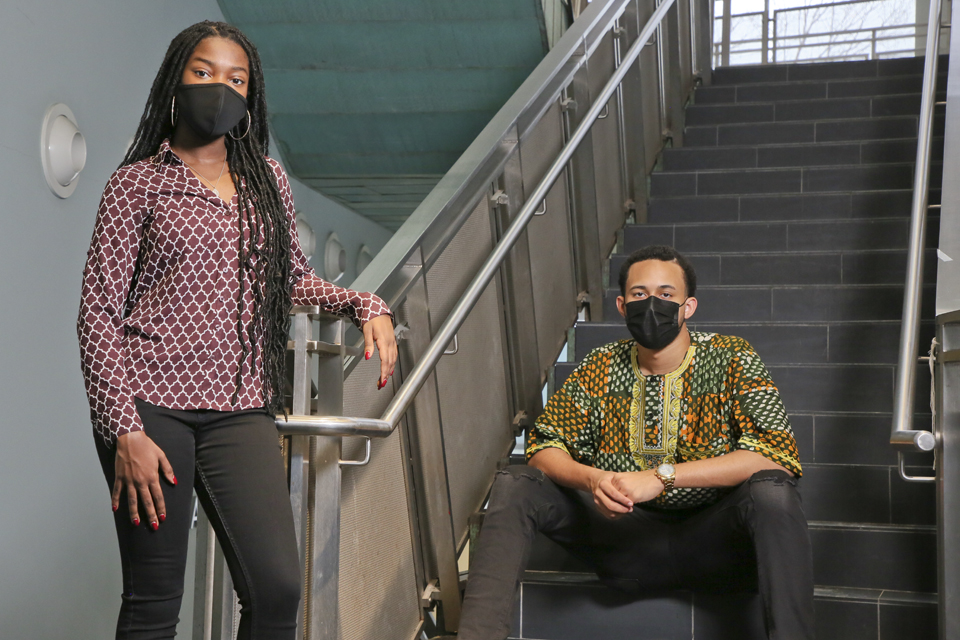The 'sacred BASO after hours'
With meetings now on Zoom, members of the Brandeis African Students Organization (BASO) find themselves talking late into the night. It's become a special time to talk about what's on everyone's mind.
 Mike Lovett
Mike LovettMelissa Nicolas and Selase Dzobo
It used to be that the Brandeis African Students Organization (BASO) met on-campus for an hour every Thursday evening.
Then along came COVID-19, requiring them to meet by Zoom, and something unexpected happened — meetings lasted for several hours, sometimes from 7 p.m. to midnight.
“We call it the ‘sacred BASO after hours,’” said BASO’s president Selase Dzobo ’21. “We'll talk about something radically different from what the first hour of the meeting was about.”
Dzobo said the Zoom meetings may start with a discussion about a current event in Africa, but then as the night goes on, they veer into such subjects as American pop culture and anecdotes about club members’ experiences on-campus.
Pre-pandemic, these issues might come up, but they weren’t discussed as in-depth as they are now, he said.
BASO was started in 2008 by African students who wanted to build community and raise awareness among Brandeis students about the complexity, diversity and richness of African culture. It currently has about 30 African, Caribbean, Caribbean American, Black American and Afro-Latinx weekly members.
“The African Students Organization at Brandeis University seeks to culturally empower African students and the student body at large to become socially, politically and critically aware of African cultures,” states the club’s official mission statement. “Even if this club leaves some with only a glimpse of Africa — the food, the music, a language — at least students will have gotten salient and actual insight into” the continent.
This mission statement describes Africa as “a continent of many but a place of one,” meaning there is great diversity between and within African countries and, at the same time, there are unifying similarities.
In a typical school year, the club’s meetings usually involve a discussion about important topics facing African and African diasporic students such as their ethical obligation to support political activism in Africa or the complexities of navigating their way through a predominantly white institution as people of color.
Sometimes the topics are more personal. For example, Dzobo, whose father was born in Ghana, said African students talk about dealing with seemingly strict parents. Once the group discussed who can and cannot use the N-word.
“It's kind of a community that we've built where everybody supports each other,” said Dzobo. “We laugh a lot. Everybody comes out for each other.”
BASO also sponsors activities such as board game nights, paint nights and trivia competitions featuring questions about Africa. Last year, the group also hosted a cooking competition where members competed to see who could make the best Indomie, a popular brand of noodle dish in Nigeria.
The club’s biggest annual event is Night for Africa. This annual showcase is an ode to the continent. Traditional African and African diasporic culture is celebrated through song, dance, spoken word, fashion and food.
There’s a fashion show that features Brandeis students strutting down a catwalk, wearing clothes of many patterns, their bodies covered in decorative paint. They also carry the flag of their family’s home country or the country from which they trace their lineage.
Last year, between Brandeis students and people from other colleges and universities in the Boston area, Night for Africa counted nearly 500 attendees.
“People felt so strongly about what we’re able to create and felt they had to be present,” said Melissa Nicolas ’21, the club’s general meeting manager.
Nicolas, whose parents immigrated from Haiti, joined BASO in her first year.
“BASO has solidified itself as a space that allows people to convene and talk about whatever they want to without feeling the pressure of the white gaze or having other people dictate what conversations we can have,” Nicolas said.
“We come together to speak in an authentic way about our experiences and about what it means to be African and what it means to be Black.”
She said she is especially appreciative of the club’s Zoom meetings this year because she sometimes feels isolated from other students.
“We'll just let the conversation continue because unfortunately, none of us are seeing each other in person like we used to,” Nicolas said. “This is a time for us to be able to join in fellowship with each other.”
Categories: Student Life





